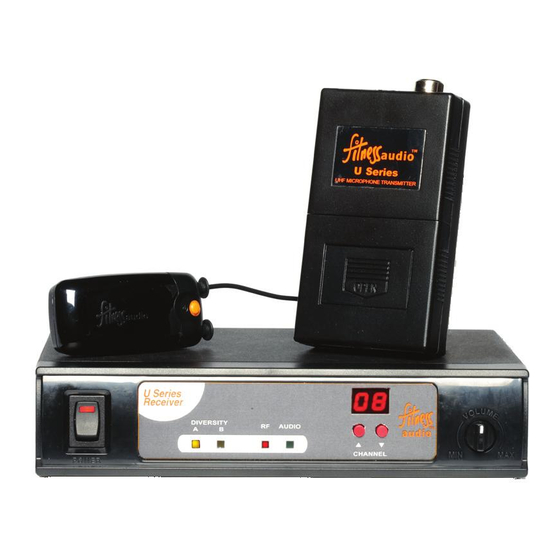FITNESS AUDIO SM-716 Manuel d'utilisation - Page 6
Parcourez en ligne ou téléchargez le pdf Manuel d'utilisation pour {nom_de_la_catégorie} FITNESS AUDIO SM-716. FITNESS AUDIO SM-716 8 pages. U series; v series
Également pour FITNESS AUDIO SM-716 : Manuel d'utilisation (8 pages), Manuel d'utilisation (6 pages), Manuel d'utilisation (8 pages), Manuel d'utilisation (8 pages), Manuel d'utilisation (8 pages)

Wireless Microphone System Operating Manual
There will be different, non-conflicting channels in other frequency groups supplied
around the world so please check with your dealer or national supplier for this informa-
tion. Fit an Alkaline AAA battery into the battery compartment, re-fit the lid and push
the sealed on/off button. A tiny blue LED illuminates to let you know it's on. When that
LED starts flashing then the usable power is running low and it's time to change the
battery. One AAA battery will supply over 5 hours of air time. Re-chargeable AAA bat-
teries can also be used.
Using Multiple Transmitters At One Location
Please note that the MT-U8 is an 8 channel transmitter and will normally be supplied
lining up with channels 01-08 on the receiver. In some countries a "B" group of chan-
nels may also be available (Ch. 09-16). In both cases the channels line up with the same
number on the receiver and then repeat - so that channel 00 is also channel 08 on the
MT-U8. If you wish to use multiple MT-U8/SM716 systems under the one roof then at
least 4 channels can be used without causing interference with each other. In the case
of the 630-650MHz range, channels 1,4, 5 or 8 can be used together. If you are also us-
ing a beltpack transmitter in the same or another room nearby, then that should be set
to a channel in the 09-16 group, of which channels 10, 12,14 or 16 will work best with
channels 1,4, 5 or 8. There will be different, non-conflicting channels in other frequency
groups supplied around the world so please check with your dealer or national supplier
for this information.
6. REMARKS
RF Interference
If you encounter receiving interference (from other than an operating TV station),
it can often be overcome by adjusting the receiver's squelch control, as described
below. Please note that wireless frequencies are shared with other radio services, and
according to FCC regulations wireless microphone operations are unprotected from
interference from licensed operations in the band. If any interference is received by
any Government or non-Government operation, the wireless microphone must cease
operation. (The above statement is valid for the U.S.A.)
Receiver Squelch control
The squelch control on the back panel of the receiver is preset at the factory, but can
be adjusted if you must use the system in a high RF interference area. If there is audio
output from the receiver when your transmitter is OFF, adjust the squelch control so
the system will receive the signal from your transmitter but squelch or eliminate the un-
wanted background RF noise. This adjustment can cause a reduction in usable range of
the wireless transmitter, so set the control to the lowest position which reliably mutes
the unwanted RF signal.
6
